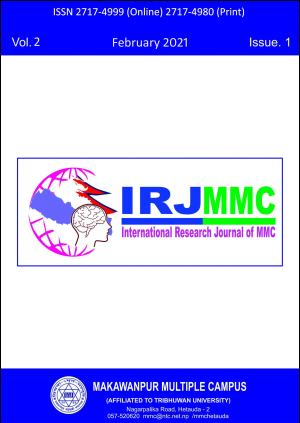Effect of Money Supply on Inflation in Nepal: Empirical Evidence from ARDL Bounds Test
DOI:
https://doi.org/10.3126/irjmmc.v2i1.35134Keywords:
ARDL Bounds test, cointegration, economy, inflation, money supply, price level, value of moneyAbstract
This study explores the long-run and short-run relationship of money supply and inflation in the context of Nepal. Data are extracted from Economic Survey of Nepal since 1964/65 to 2018/19 to obtain the relationship. ARDL Bounds test is used for cointegration test where the dependent variable is inflation and money supply and Indian inflation are taken as independent variables to estimate the model. Result shows the long-run cointegration between the variables reveals long-run relationship and the error correction term is found to be negative (-0.98) and significant (p=0.02). The study suggests that policy makers can reduce the impact of money supply on inflation and should focus on the control of inflation adopting monetary and fiscal policy mechanism. Creeping inflation in the pace of economic growth is desirable and successful cure of inflation will help in stability and growth of the country.
Downloads
Downloads
Published
How to Cite
Issue
Section
License
This license enables reusers to distribute, remix, adapt, and build upon the material in any medium or format for noncommercial purposes only, and only so long as attribution is given to the creator.

